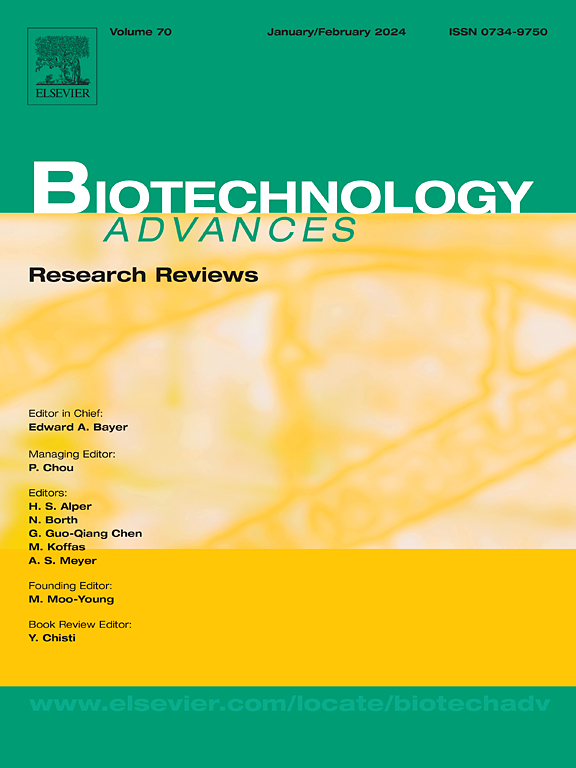糖基化对开发用于医疗用途的特定细胞因子及其衍生物的影响。
IF 12.5
1区 工程技术
Q1 BIOTECHNOLOGY & APPLIED MICROBIOLOGY
引用次数: 0
摘要
细胞因子是免疫反应的重要调节因子,使其成为自身免疫性疾病和癌症治疗的诱人靶点。然而,细胞因子糖基化的重要性仍被低估。许多细胞因子都带有 N-和 O-糖基,有些甚至会发生 C-甘露糖基化。在异源宿主细胞中产生的重组细胞因子可能缺乏聚糖,或表现出不同的糖基化模式,如与人类细胞因子相比,不同程度的半乳糖基化、硅氨酰化、岩藻糖基化或木糖添加,从而可能影响关键的免疫相互作用。我们重点研究了目前正在使用或设计用于高级治疗的细胞因子,包括免疫细胞因子、免疫细胞因子、吸引细胞因子和基因工程 "超级细胞因子"。尽管这些细胞因子衍生物设计新颖,但它们的糖基化模式还没有得到广泛研究。通过研究人类原生细胞因子、G-CSF 和 GM-CSF、干扰素 β 和 γ、TNF-α 以及白细胞介素-2、-3、-4、-6、-7、-9、-12、-13、-15、-17A、-21 和-22 的糖基化,我们旨在评估它们对其治疗衍生物的潜在影响。了解原生细胞因子的糖基化可为这些下一代细胞因子疗法的安全性、有效性和功能性提供重要的见解,这些见解会影响稳定性、生物活性、抗原性和半衰期等因素。这些知识可以指导选择最佳的表达宿主进行生产,并推动基于细胞因子的有效疗法和合成免疫学药物的开发。本文章由计算机程序翻译,如有差异,请以英文原文为准。
Implications of glycosylation for the development of selected cytokines and their derivatives for medical use
Cytokines are important regulators of immune responses, making them attractive targets for autoimmune diseases and cancer therapeutics. Yet, the significance of cytokine glycosylation remains underestimated. Many cytokines carry N- and O-glycans and some even undergo C-mannosylation. Recombinant cytokines produced in heterologous host cells may lack glycans or exhibit a different glycosylation pattern such as varying levels of galactosylation, sialylation, fucosylation or xylose addition compared to their human counterparts, potentially impacting critical immune interactions.
We focused on cytokines that are currently utilized or designed in advanced therapeutic formats, including immunocytokines, fusokines, engager cytokines, and genetically engineered ‘supercytokines.’ Despite the innovative designs of these cytokine derivatives, their glycosylation patterns have not been extensively studied. By examining the glycosylation of the human native cytokines, G-CSF and GM-CSF, interferons β and γ, TNF-α and interleukins-2, −3 -4, −6, −7, −9, −12, −13, −15, −17A, −21, and − 22, we aim to assess its potential impact on their therapeutic derivatives. Understanding the glycosylation of the native cytokines could provide critical insights into the safety, efficacy, and functionality of these next-generation cytokine therapies, affecting factors such as stability, bioactivity, antigenicity, and half-life. This knowledge can guide the choice of optimal expression hosts for production and advance the development of effective cytokine-based therapeutics and synthetic immunology drugs.
求助全文
通过发布文献求助,成功后即可免费获取论文全文。
去求助
来源期刊

Biotechnology advances
工程技术-生物工程与应用微生物
CiteScore
25.50
自引率
2.50%
发文量
167
审稿时长
37 days
期刊介绍:
Biotechnology Advances is a comprehensive review journal that covers all aspects of the multidisciplinary field of biotechnology. The journal focuses on biotechnology principles and their applications in various industries, agriculture, medicine, environmental concerns, and regulatory issues. It publishes authoritative articles that highlight current developments and future trends in the field of biotechnology. The journal invites submissions of manuscripts that are relevant and appropriate. It targets a wide audience, including scientists, engineers, students, instructors, researchers, practitioners, managers, governments, and other stakeholders in the field. Additionally, special issues are published based on selected presentations from recent relevant conferences in collaboration with the organizations hosting those conferences.
 求助内容:
求助内容: 应助结果提醒方式:
应助结果提醒方式:


